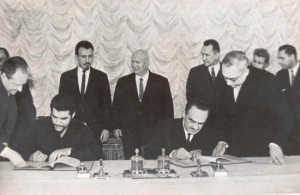In 1992, at the conclusion of a conference on the writer José María Chacón y Calvo in the Office of the Historian of the City, during the symposium conducted by the Provincial Directorate of Culture, they gave me two tomes on the economic thought of Ernesto Guevara, one of the commanders of the guerrillas led by Castro, who was named as Chairman of the Central Bank and Minister of Industry for the Revolutionary Government before he went to the jungles of Africa and then Bolivia, to expand his communist ideas.
As the books seemed like a joke to me I left them on the table, but one of the organizers insisted on giving them to me; I had to tell him they weren’t originals, because Che was not an economist nor did he have time to write such pamphlets.
I suppose the scene has been repeated for decades, because each year the Cuban publishers discover and publish “unpublished” libels attributed to the guerrilla, as well as biographies about his life and work, leaving aside, of course, the black legend of his crimes, his ineffectiveness as a government official and his military failures in Africa and Bolivia, where he intended to establish dictatorships similar to that of his partners in Cuba, who have justified their long tenure in power for half a century with little anecdotes of freedom, the blockade and other myths.
Books, films, articles, photographs, key chains, shirts, posters and radio and TV media make up the arsenal that supports this mythologized boutique hero, fabricated by the historians and the media in Cuba with the complicity of the liberal press of the United States and the Left in Europe and Latin America, whose greed knows no limits or shame.
In overestimating the likes of Guevara, the Castros or Hugo Chavez, the media affiliates itself with totalitarianism. Like those pre-Columbian Incas who worshiped the dead to enslave the living, the architects of the socialist propaganda distort the truth and legitimize anti-democratic dictatorships.
Faced with such manipulation it would be worth viewing the film Che: The Other Side of an Idol, by Cuban filmmaker Agustin Blazquez, who offered the testimony of some victims of the Argentine guerrilla, who shot scores of people on occupying the city of Santa Clara, as well as hundreds of soldiers of the former regime in the Cabaña Fort, where he ordered summary executions, without lawyers or witnesses, and collective trials with disproportionate sentences.
 That Che was a Marxist and true to his ideals is fine; that he committed errors and made arbitrary decisions during the war, also fine; but to portray him as a humanist, liberator and Christian is a mockery of the guerrilla, who rejected the respect of his worshipers in a letter to his mother from a prison in Mexico: “I am not Christ nor a philanthropist, I am quite the opposite of Christ. I fight for things that I believe in with every weapon at my disposal and try to kill the other so that he won’t nail me to any cross…”
That Che was a Marxist and true to his ideals is fine; that he committed errors and made arbitrary decisions during the war, also fine; but to portray him as a humanist, liberator and Christian is a mockery of the guerrilla, who rejected the respect of his worshipers in a letter to his mother from a prison in Mexico: “I am not Christ nor a philanthropist, I am quite the opposite of Christ. I fight for things that I believe in with every weapon at my disposal and try to kill the other so that he won’t nail me to any cross…”
Guevara was perhaps more honest than his Caribbean bosses and lacked the time to become corrupt and cling to power, because he left the island in 1965 in search of new adventures; which does not absolve him of the excesses of the Castro regime because his time in government posts helped destroy the Cuban economy and industry, which has subsequently been marked by improvisation, irresponsibility and extortion of workers.
Those who sanctify the guerilla who disappeared in 1968 ignore the testimony of his pride, arrogance and contempt for the lives of animals and people. They forget the participation of Guevara in Sovietizing Cuba. This architect of the violence nurtured in Moscow managed to install nuclear missiles on our island and when they were withdrawn he confirmed to the British journalist Sam Russell: “If the missiles had remained in Cuba, we would have used them against the very heart of the United States including New York City. ”
Every time I recall the overdose of images, books and speeches about the past of this protagonist what comes to my mind is the puppy killed on his orders, and the hundreds of useless sacrifices he ordered. I think, then, of his passage from the mirror to the vacuum, when the chaos of those who created him ceases.
